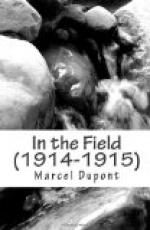It seems that moral suffering is less keen when it can be shared with others. I shall never suffer again what I suffered that day.
II. THE FIRST CHARGE
September 4.
Six o’clock in the evening.
The atmosphere was heavy and stifling. The regiment had been formed into two columns, to the right and the left of the high-road from Vauchamps to Montmirail. The men, tired out, their faces black with dust, had hardly dismounted when they threw themselves on the ground and slept in a field of cut corn. The officers chatted together in groups to keep themselves awake. Nights are short when you are on campaign. The bivouac was pitched at midnight and was to be struck at three o’clock in the morning.
And since six o’clock the battle had been raging, for the enemy had engaged our rearguard almost immediately. This had happened each day of that unforgettable retreat, begun at the Sambre and pushed beyond the Marne. Each day we had had to fight. Each day the enemy was repulsed. Each day we were obliged to retire.
Brother-soldiers!—you who came through those painful hours—shall you ever forget them? Shall you ever forget the anguish that wrung your hearts when, as the sun was sinking, you, who had seen so many of your comrades fall, had to give up a further portion of our sweet France; to deliver up some of our lovely hamlets, some of our fields, our orchards, our gardens, some of our vineyards, to the barbarians?... You were ordered to do so. We have learnt, since then, how important such sacrifices were. But, at the time, we did not know ... and doubt came into our minds. We passed through cruel days, and nothing will ever efface the impression of physical and moral prostration that overcame us then.
The regiment was sleeping—tired out.
Alone, calm, phlegmatic, the Colonel kept watch, standing in the middle of the road. With his pipe between his teeth, beneath his ruddy drooping moustache, his cap pulled over his eyes, his arms crossed on his light-blue tunic, he seemed to be the ever-watchful shepherd of that immense flock. At such moments the chief must be able to seem unconscious of the self-abandonment, the disorder and the exhaustion of his men. Human powers have their limits. They had been expended for days without stint. Every moment of cessation from actual fighting had to be a moment of repose. The important thing is that the chief should keep watch. Brave little Chasseurs! sleep in peace; your Colonel is watching over you.
I looked at the men of my troop, on the ground in front of their horses. How could I recognise the smart, brilliantly accoutred horsemen, whose uniforms used to make such a gay note in the old-fashioned streets of the little garrison town?
Under the battered shakoes with their shapeless peaks, the tanned and emaciated faces looked like masks of wax. Youthful faces had been invaded by beards which made them look like those of men of thirty or more. The dust of roads and fields, raised by horses, waggons, and limbers, had settled on them, showing up their wrinkles and getting into eyes, noses, and moustaches.




